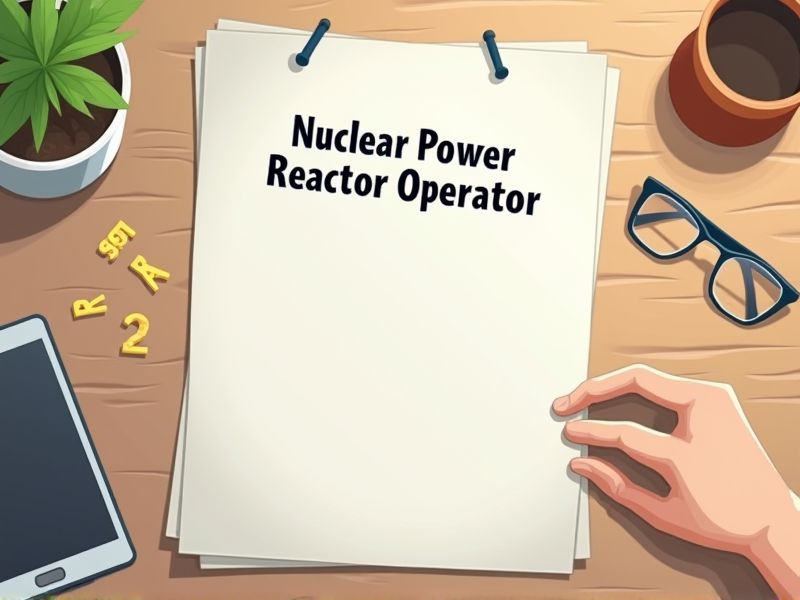
Nuclear Power Reactor Operators require specific certifications to ensure they can safely manage the complexities and hazards associated with nuclear facilities. The certifications serve as a standardized measure of knowledge and skill, crucial for mitigating risks and preventing accidents. Regulatory bodies mandate these credentials to align operational procedures with safety and environmental laws. Key certifications you may need as a Nuclear Power Reactor Operator include these essential ones.
NRC Nuclear Power Reactor Operator License
The NRC Nuclear Power Reactor Operator License is essential because it ensures operators have the necessary training and knowledge to manage reactor operations safely. This licensing process helps maintain regulatory oversight, minimizing risks of accidents and ensuring compliance with federal standards. It promotes trust among the public and stakeholders by demonstrating the operators' competence in handling nuclear materials. It also provides a structured framework for continued education and competency evaluation, vital for adapting to technological advancements and evolving safety protocols.
NRC Senior Reactor Operator License
The NRC Senior Reactor Operator License ensures the operator has the necessary knowledge and skills to manage complex systems within a nuclear power reactor safely. This requirement reduces the risk of human error, which can lead to significant safety hazards. It provides operators with the authority to make crucial decisions during both normal operations and emergency situations. Regulators mandate this licensing to maintain high safety standards and protect public health and the environment.
Radiation Protection Officer Certification
Radiation Protection Officer Certification ensures that Nuclear Power Reactor Operators are equipped with necessary knowledge to manage and minimize exposure to harmful radiation. This certification standardizes procedures for monitoring and controlling radiation levels, crucial for maintaining workplace safety. It provides operators with training in emergency response protocols, which is vital in preventing accidents and mitigating health risks. Certification acts as a regulatory requirement, ensuring compliance with federal and international safety standards.
Nuclear Regulatory Commission Compliance Certification
Nuclear Regulatory Commission (NRC) Compliance Certification ensures that operators meet stringent safety standards, minimizing the risk of nuclear accidents. Without such certification, operators may lack essential knowledge and skills to safely manage reactor operations. The certification process provides a structured framework for ongoing training and performance evaluation, promoting continuous operational excellence. This compliance also builds public trust, reassuring communities about the safe management of nuclear power facilities.
Advanced Simulator Training Certification
Nuclear power reactor operators face complex challenges that require precise decision-making, and advanced simulator training certification equips them with the skills to handle real-world scenarios effectively. The high-stakes environment of nuclear power demands rigorous training to ensure operators can safely manage unexpected situations. Certification validates an operator's competence and ensures adherence to regulatory standards, thereby enhancing safety and reliability. Continuous simulator training supports skill retention and increases operators' confidence in managing reactor operations, directly impacting operational safety and efficiency.
Nuclear Emergency Preparedness Certification
The need for Nuclear Emergency Preparedness Certification for a Nuclear Power Reactor Operator stems from the critical importance of maintaining operational safety. Without certification, operators may lack the necessary skills to effectively manage and respond to potential nuclear incidents, which could lead to disastrous consequences. Proper training ensures operators can implement emergency protocols and coordinate with emergency response teams, minimizing risks to public health and safety. Certification also aligns with regulatory requirements, which helps in maintaining trust and compliance within the nuclear energy sector.
Occupational Safety and Health Administration (OSHA) Certification
OSHA Certification is necessary for Nuclear Power Reactor Operators to ensure adherence to safety standards and protect both operators and the environment from hazardous incidents. Certification helps in minimizing human errors by equipping operators with essential safety protocols and operational procedures. It ensures compliance with regulatory requirements, thereby reducing the risk of costly violations and potential shutdowns. Enhanced safety measures lead to increased public confidence in nuclear power as a reliable energy source.
Non-Destructive Testing (ASNT) Certification
Non-Destructive Testing (ASNT) Certification ensures that nuclear power reactor operators have the competence to assess structural integrity without causing damage. This certification reduces the risk of catastrophic failures, thus enhancing safety in nuclear facilities. Through non-destructive methods, operators can identify potential issues before they escalate, contributing to extended plant life and efficiency. Training and certification in NDT align operators with industry standards, ensuring consistent and reliable assessments across all operations.
Certified Maintenance & Reliability Technician Certification
The rigorous environment of nuclear power plants necessitates a deep understanding of maintenance and reliability to ensure operational safety and efficiency. Certified Maintenance & Reliability Technician Certification equips operators with the skills to identify and resolve potential equipment failures before they escalate. Enhanced reliability practices help prevent costly downtime and accidents, safeguarding both the plant and surrounding communities. Regulatory compliance often requires certified expertise to meet safety and operational standards in high-risk industries like nuclear energy.
Project Management Professional (PMP) Certification
Obtaining a PMP Certification equips nuclear power reactor operators with skills in project planning, ensuring effective task execution and resource management in high-stakes environments. Efficient project management practices help in minimizing operational risks associated with nuclear power plant maintenance and upgrades, thus enhancing safety measures. A structured approach gained through PMP training facilitates communication and coordination among multi-disciplinary teams, critical in managing complex nuclear operations. Though nuclear expertise is paramount, PMP Certification complements technical knowledge by fostering a culture of continuous improvement and accountability in project execution.
Summary
When you obtain certifications as a Nuclear Power Reactor Operator, your qualifications will significantly enhance. This elevated status can increase your job security and potential for higher earnings. The certification also ensures that your skills and knowledge meet rigorous industry standards, increasing operational safety. More opportunities for career advancement may arise as a result of your specialized expertise.
